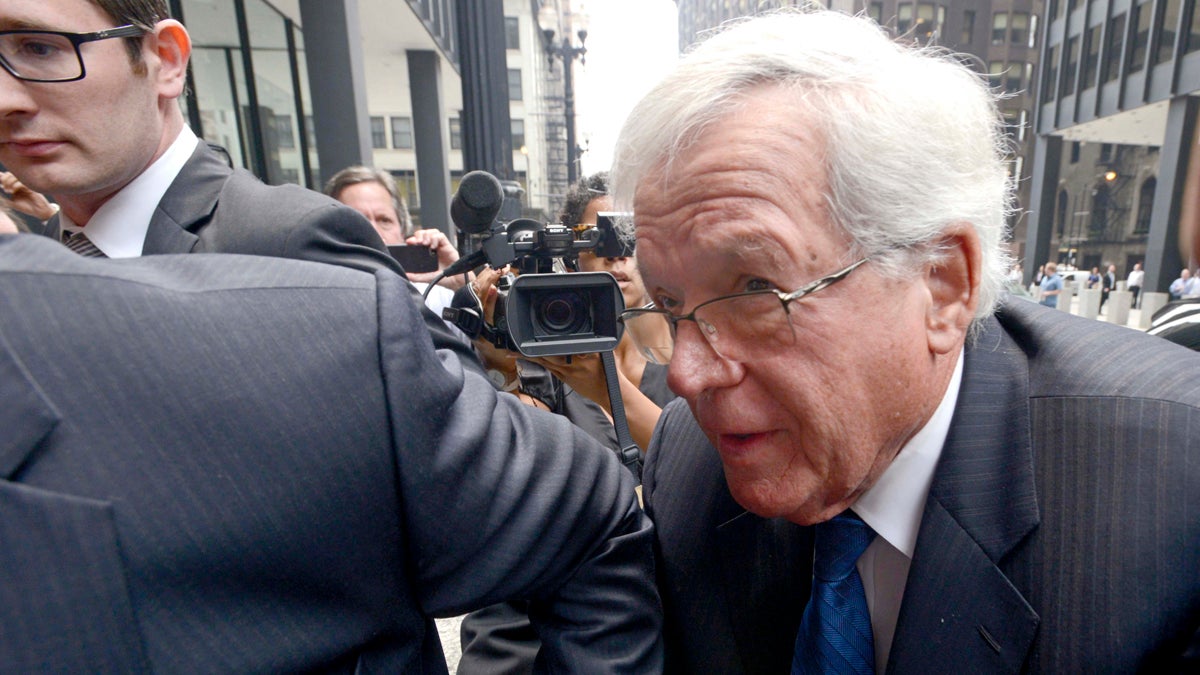The revolving door scandal: How Dennis Hastert got his coverup cash

In this June 9, 2015 file photo, former House Speaker Dennis Hastert arrives at the federal courthouse, in Chicago for his arraignment on federal charges that he broke federal banking laws and lied about the money when questioned by the FBI. The federal judge assigned to the case against Hastert will continue to preside over it after disclosing connections to the former U.S. House Speaker and several attorneys. Prosecutors and lawyers for Hastert filed paperwork Thursday, June 11, 2015, saying they're willing to have U.S. District Judge Thomas M. Durkin remain on the case. (Paul Beaty/AP Photo)
Family values fraud Dennis Hastert (1999: “We must continue to be proactive warding off the pedophiles and creeps who want to take advantage of our children”) was arraigned this week in federal court on charges that he violated banking laws and lied to the FBI about hush money he was reportedly paying to conceal past sexual abuse of an underage student. He pleaded innocence.
According to the federal indictment, it’s quite a scandal – Hastert, the former House Speaker, formerly third in line to the presidency, is the latest on a long congressional list of family values frauds – but we do need to highlight the more systemic scandal, the one that made it possible for Hastert to gin up the hush money in the first place. The conservative Washington Examiner says it well:
“Hastert monetized his public service into a lucrative lobbying career…In both his lobbying and his self-enriching land deals, Hastert embodied what ails Washington and what has so much of the country so sick of Washington.”
This scandal was classic Washington, and perfectly legal. Hastert paid out $1.7 million to the guy known in the indictment as “Individual A,” and he had promised to pay $1.8 million more, all because he had successfully swiveled through the revolving door. That’s the D.C. term for cashing in on the congressional job. Ex-lawmakers become lobbyists (or “senior advisers”), and they make a pile of money. Forty years ago, virtually no lawmakers went that route; today, 427 ex-members are working in the lobbying sector.
That’s what Hastert did, soon after he quit the House in 2007; he joined a lobbying firm, many of whose clients had donated lavishly to Hastert during his career. And in 2010, at the behest of Individual A, Hastert reportedly ratcheted up his lobbying work, in “a burst of activity to increase his wealth.” How fortunate it was that he had the monetary means to keep his public image pristine. His role, on behalf of his benefactors, was merely “to make introductions to government officials,” because that’s what revolving-door lawmakers do.
We know now, of course, that the revolving door spun so fast that it whacked him upside the head.
But that’s not the whole story. Hastert began to profit from his public service while he was still on the taxpayer’s dime. He came to the House as a man of modest means, and left the House as a multimillionaire – thanks to what the Washington Examiner called “his self-enriching land deals.” This too was a standard Washington scandal, the legal kind.
The nonpartisan Sunlight Foundation documented Hastert’s dealings back in 2006 (when nobody cared), and Norman Ornstein of the conservative American Enterprise Institute think tank co-authored an article. The gist is that Hastert, in cahoots with some wealthy Illinois patrons, bought 138 acres of farmland at bargain prices. Then he “used his clout as Speaker” to craft a $207-million earmark for a federal highway interchange – to be located one mile from the purchased land. Result: a huge hike in the value of the land he owned. Part of it was sold off to a developer, who put $3 million into Hastert’s pocket. Sweet.
So, with all these revenue streams, Hastert seemed well positioned to hide his family values fraudulence (2003: It’s “important to stop those predators before they strike, to put repeat child molesters into jail for the rest of their lives”). And if only he had hewed more conservatively to the banking laws, he’d probably be in the clear today, cashing in – like more than 400 former colleagues – on his congressional service, in virtual perpetuity. Long after his criminal status is resolved, the systemic revolving door will continue to be the real scandal.
——-
A few weeks back, I listed a number of family values frauds, lawmakers who preached morality but practiced the opposite: Hastert, Newt Gingrich, Bob Livingston, Mark Souder, John Ensign, David Vitter, Vito Fossella, Strom Thurmond, Henry Hyde, Vance McAllister, Mark Foley. Inexplicably, I forgot Mark “Appalachian Trail” Sanford and Larry “Wide Stance” Craig.
Surely you remember Larry Craig, the closeted Idaho senator who was arrested at an airport in ’07 after he played footsie with the guy in the adjacent bathroom stall. This is awesome: Craig paid his legal fees by raiding his campaign treasury. The Federal Elections Commission said that was wrong, and demanded that he repay the money. Craig’s defense (get this, folks) was that raiding his campaign treasury was proper…because, at the time of his footsie, he was traveling between Idaho and Washington in his official capacity as a senator.
Top that one, Dennis Hastert.
Follow me on Twitter, @dickpolman1, and on Facebook.
WHYY is your source for fact-based, in-depth journalism and information. As a nonprofit organization, we rely on financial support from readers like you. Please give today.

